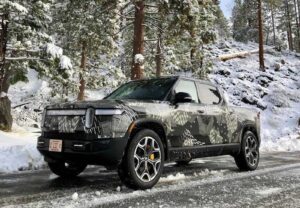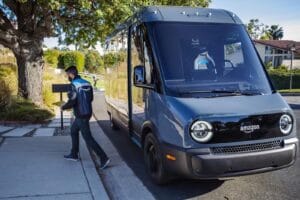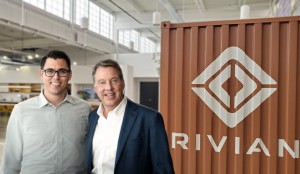
Since June 2020, seemingly every major EV maker — save Tesla — has jumped on the blank-check company bandwagon to bolster its cash coffers and go public, except for one: Rivian.
Reportedly Rivian now wants in. However, it’s taking the more traditional route: an initial public offering. The IPO is reported to be a $50 billion deal. The initial timeline suggests a September launch but depending upon a variety of factors, it could get pushed into Q1 2022, which is when the company should be in full production of its R1T and R1S electric vehicles, according to Bloomberg News.
A spokesperson from Rivian declined to comment to TheDetroitBureau.com on the possbility. Until now, the EV maker had been supported by private investors, including Amazon, Ford Motor Co. and investment house T. Rowe Price.
Nascent maker relied on investors
Rivian’s managed to keep things in-house, so to speak, for a while now, relying on several rounds of private funding to keep the company moving forward through development and the establishment of a production line at a former Mitsubishi plant in Normal, Illinois.

Last month, T. Rowe Price led a $2.65-billion investment round. This round also included new investments Fidelity Management and Research Co., Amazon’s Climate Pledge Fund, Coatue and D1 Capital Partners as well as several other existing and new investors, according to a statement from Rivian.
Founded in 2009 the nascent EV maker’s gone through a long gestation period, developing what it describes as a vertically integrated a connected electric platform that can be flexibly applied to a range of applications, including the company’s adventure products as well as B2B products such as the Amazon last mile-delivery van.
The online retail giant ordered 100,000 of the vans from the company. They are beginning to test them in Los Angeles with the program expanding to 15 other cities in the U.S. Rivian and Amazon worked together to develop the vans, which ride on the maker’s skateboard.
Maker’s raised billions for operations
In addition to the recent fundraising effort, Rivian completed a $2.5 billion funding round last July, also led by funds and accounts advised by T. Rowe Price. In early 2019, Rivian announced a $700 million funding round led by Amazon.

It was followed by Ford Motor Co.’s $500 million investment in April 2019, and that the companies would collaborate on a future program. Cox Automotive soon after invested $350 million, which also included plans for collaboration on logistics and service.
In all, Rivian’s raised about $8 billion from investors since the start of 2019. At least one investor, Ford must be pleased thus far, noting it expected to earn $900 million from its investment in 2021. However, the impact of the cash proceeds of a new stock offering is tough to ignore. The company is facing significant cost increases related to the roll out of its new EVs.
The company’s deliveries of pickups would start in June 2021 on a reduced run rate, with the SUVs following in August. Full production of the vehicles wouldn’t take off at full speed until early 2022. Launch editions of the vehicles, which sold out in very short order, are priced at $75,000 and $77,500, respectively, with a 300-mile (480 km) driving range for both.







